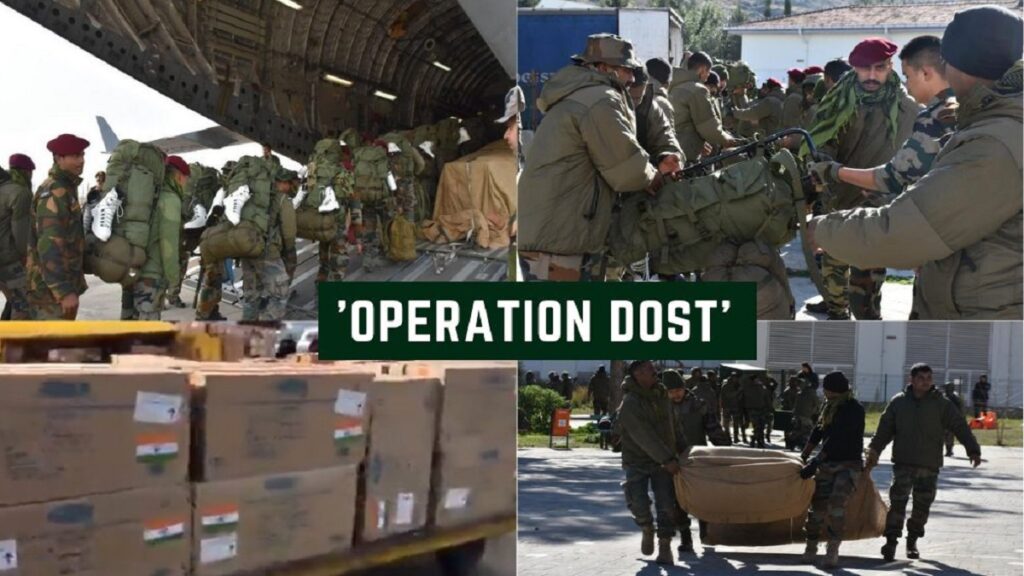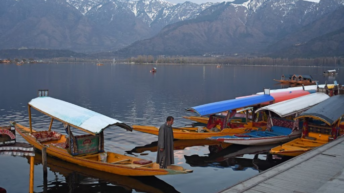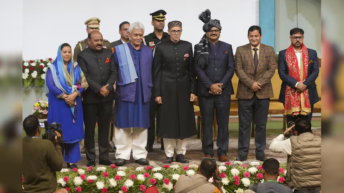|
Listen to article
Getting your Trinity Audio player ready...
|

Diplomacy is the art and science of mending broken hearts– converting your worst enemies into your best friends without firing a bullet. India has always treated even its enemy with dignity and respect. In the 1971 war even after capturing hundreds of square kilometres of enemy territory in East Pakistan, the Indian Army vacated it gracefully and allowed the creation of Bangladesh as an independent nation. After taking 93,000–95,000 Pakistani soldiers as prisoners of war – in the largest surrender since World War II – not a single one of them was tortured. Rather the POWs were transported by train and air to camps in different parts of India where the Indian army took care of their safety and wellbeing.
Lt Gen J. S. Aurora even allowed the Pakistani prisoners of war to retain their small arms to protect themselves. The Mukti Bahini militia wanted to torture the Pakistani prisoners of war to seek revenge for the atrocities committed by their fellow soldiers but India treated them strictly in accordance with the Geneva Convention and eventually released them safely.
In line with its humanistic tradition India empathetically responded to quake-hit Turkey’s distress calls. This seems to have hit the right chord in Turkey’s heart.
A Turkish diplomat hit the nail on its head when he said, “Turkey is another India”.
‘Qutub Minar’ is just one of the many monuments that evoke the historic bonds between India and Turkey. For instance, there are well over 9000 common words to Hindi and Turkish like Dost (friend), Dil (heart), Tamanna (desire), Hava (air), Parda (curtain), Paneer (cheese), Ajnabi (stranger), Kismat (destiny), Rab (God), Mohabbat (love), Tareef (flattery), Izzat (respect), Arzoo (desire), and Alvida (goodbye).
Still, Turkey somehow does not respect India’s sentiments on several issues largely because of its unconditional support for Pakistan. This, however, did not prevent India from responding promptly to quake hit Turkey’s distress calls and proved the point that Turkey may be far but remains close to India’s heart.
It was Prime Minister Narendra Modi’s initiative to extend all possible assistance and humanitarian aid to help Turkey cope with the earthquake and at the same time subtly convey the message that there are no permanent friends or enemies in international relations, and a friend in need is a friend indeed.
Tremors are fairly common in Turkey –one of most earthquake-prone countries in the world, but the three earthquakes–measuring 7.8, 7.6, and 6.0 in magnitude on the Richter scale and some 120 aftershocks in less than 24 hours — on 6 February 2023, proved to be the deadliest natural disasters in modern Turkish history.
These most powerful earthquakes in the last 100 years – left behind more than 5000 people dead or wounded and over 5,775 buildings were raised to the ground. Thousands of people were rendered homeless in freezing cold. The impact of the quakes was felt as far away as Cyprus (456 km), Lebanon (874 km), Israel (1,381 km), and Egypt (1,411 km).
Expressing his empathy for the people in earthquake-torn people of Turkey and Syria Prime Minister Modi decided to immediately send search & rescue, medical teams, and relief materials. It was a perfect example of proactive diplomacy where you convert enemies into friends – without fighting a pitched battle.
A high-level meeting was held in South Block and it was decided to immediately rush two teams of about 100 National Disaster Relief Force (NDRF) personnel, as well as their specially trained dog squads, drilling machines, and relief material. Meanwhile, doctors and paramedics from the 60th Para Field Hospital in Agra as well as a huge amount of lifesaving medicines were rushed to Turkey in IAF aircraft. The 8th Battalion of NDRF led by Commandant P.K. Tiwari played a key role in this operation and the relief and rescue began in full swing as soon as the IAF C-17 Globemaster III heavy lift aircraft landed in Turkey a few hours later.
India was one of the few countries that from the very beginning, and prior to its own liberation, supported the formation of the Turkish republic with which it established diplomatic relations in 1948.
Islam is the glue that binds Turkey and Pakistan – two staunchly Muslim nations. Pakistan had always occupied a special place in the hearts and minds of the Turkish leadership, government, and people. The same holds true for Turkey in the Pakistani mindset.
Turkey was among the first few countries to welcome Pakistan’s birth and support its inclusion in the United Nations. Diplomatic relations between Turkey and Pakistan started in 1947, as soon as Pakistan gained independence.
Quaid-i-Azam Muhammad Ali Jinnah visited Turkey in December 1947 and stated that: “Pakistan admires the glorious past of Turkey and its administrative achievements and organizational abilities in the past and present times. Pakistan is now two months old, and in the near future, the two brotherly countries are going to establish close cultural, commercial, and political relations. A new happy era will emerge for these two countries.”
On March 1948 Jinnah told Yahya Kemal Beyath the first Turkish ambassador to Pakistan: ‘Turkey has drawn our admiration for the valor of Turkish people and the way in which your statesman and the leaders have struggled and fought almost single-handed in the midst of Europe for your freedom and sovereignty which is worth mentioning, I really can assure your excellency that the Muslims of Pakistan will entertain sentiments of affection and esteem for your country and now Turkey and Pakistan both as free, sovereign and independent countries can strengthen their ties more and more for the good of both’.
Jinnah was a great fan of Field Marshal Mustafa Kemal Atatürk the founder and first president of Turkey and secretly wanted to develop Pakistan on the same model.
Even today there are many roads in Islamabad (Atatürk Avenue), Karachi, Lahore, Peshawar, and Larkana in Pakistan named after Atatürk, while Cinnah Caddesi one of the most important roads in Turkey’s capital Ankara is named after Jinnah (Jinnah is spelled as ‘Cinnah’ In the Turkish language).
The late General Pervez Musharraf spent his early childhood (1949–56) in Istanbul and Ankara where his father was posted on a diplomatic assignment with the Pakistani Foreign Ministry. He admired the role the Turkish military played in the country’s domestic policies. Musharraf, who could speak Turkish, saw Mustafa Kemal Pasha as his hero. Even after being commissioned in an artillery regiment Musharraf attended many military training courses in Turkey.
In 2004 just one month after he survived two assassination attempts in his own country Musharraf visited Turkey because he wanted someone he could trust to watch his back. Their common enemies were radical Islamic groups affiliated with Al-Qaeda which were believed to be behind the suicide bombings in Turkey in November 2003.
Behind the façade of a joint initiative to fight against terrorism and organized crime Musharraf’s agenda was to exchange information and experts between the two countries. Musharraf also addressed the Turkish Grand National Assembly and met Recep Tayyip Erdogan who was then Prime Minister and is now President of Turkey.
In a rare gesture, Pakistan invited Erdogan to address the Pakistani parliament on October 26, 2009, and was awarded Nishan-e-Pakistan (Order of Pakistan) – Pakistan’s highest civilian award. These were some of the few things that influenced the chemistry between Pakistan and Turkey.
Turkey mistakenly believes that Jammu and Kashmir is a part of Pakistan and also being an Islamist nation, it is its duty to care for Kashmiris, just like the Palestinians — for whom it has alienated Israel and the USA – who were once its best friends. Pakistan in return supports Turkey’s policy in Cyprus.
Erdogan dropped a bombshell when during a visit to Pakistan at the invitation of then Prime Minister Nawaz Sharif in November 2016 he expressed a desire to mediate between India and Pakistan to settle the long-standing Kashmir issue and thus relieve the immense agony and suffering of the Kashmiri Muslims.
Both India and Turkey have been shadowboxing –hitting each other, indirectly, in various international forums. Turkey reportedly supported Pakistan on the Jammu and Kashmir issue, regarding the revocation of article 370 in the United Nations in September 2019.
Erdogan raised the Kashmir issue several times at the United Nations General Assembly (UNGA) in 2019, 2020, and 2021. Modi responded by meeting with the leaders of Armenia, Cyprus, and Greece, with whom Turkey has strained relations and disputes. Modi also canceled his visit to Turkey and only visited Saudi Arabia in October 2019, sending a strong message to Ankara that it cannot take India for granted.
This however did not prevent Erdogan from raising the Kashmir issue again in his speech at the UNGA in 2022 – just a week after meeting Modi. Turkey is also opposing India’s inclusion in the Nuclear Suppliers Group.
Turkey is today a major arms supplier to Pakistan. Turkey sold four MILGEM-class (MILGEM project) Ada class corvette ships to Pakistan, while Pakistan supplied Super Mushak trainer turbo-props to help the Turkish Air Force tide over a shortage of pilots. Pakistan is interested in purchasing T129 ATAK twin-engine, multi-role attack helicopters for the Pakistan Army Aviation Corps (PAAC), to replace the aging Bell AH-1F Cobra gunships. Turkey also helped train Pakistan air force officers and upgrade its F-16 fleet.
Over 1,500 Pakistani military officers have received training in Turkey and the two nations are hoping to jointly produce fighter jets, drones, and stealth fighters.
Turkey supported Pakistan during the 1971 war and did not recognise Bangladesh as an independent state until Pakistan did so in 1974.
Of late Turkey has also been encouraging radical Islamic youth to relocate to Istanbul and Ankara and is fast developing as a hub for all kinds of conspiracies and anti-India activities like indoctrinating journalists, providing scholarships, and funding anti-India NGOs. Insan Hak ve Hurriyetleri ve Insani Yardim Vakfi (IHH), a Turkish NGO has close links with the Popular Front of India (PFI), a radical Islamic political organization banned by the Indian Home Ministry for a period of five years under Unlawful Activities (Prevention) Act (UAPA) on 28 September 2022. The PFI is allegedly promoting radical Islam and nurturing violent activist groups. As the saying goes there can be no smoke without fire. Some of the weapons recently seized from terrorist groups were found to have Turkish markings.
On yet another occasion Turkey helped Pakistan set up a secret cyber-army to attack the US and India in the guise of rebutting propaganda and disinformation against Pakistan and its rulers. The plan was reportedly hatched in 2018 and given a green signal by then-Prime Minister Imran Khan. The confidential plan was allegedly developed at the highest level in Islamabad’s interior ministry. Even senior officials were kept out of the discussions which were carried out on a need-to-know basis, though Shehryar Khan Afridi, the then Pakistani minister of state for interior, and the Turkish Interior Minister Suleyman Soylu were kept in the loop. Interestingly the then Prime Minister Imran Khan himself officiated as the Union interior minister.
The stalemate continues even today… essentially because of Turkey’s reluctance to deal with India separately – without including Pakistan in the picture.
On the face of it India’s smart humanitarian diplomatic initiative towards Turkey seems to have hit the bull’s eye. Fırat Sunel (@firatsunel) the Turkish Ambassador to India, Nepal, and Bhutan tweeted:
“Dost” is a common word in Turkish and Hindi… We have a Turkish proverb: “Dost kara günde belli olur” (a friend in need is a friend indeed).
This is exactly what India wanted. As they say- all is well that ends well. The credit for this proactive diplomacy victory goes to Modi who master-minded the entire exercise and made the right moves at the right time.






Add comment